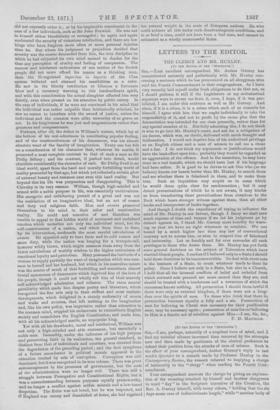LETTERS TO THE EDITOR.
THE CLERGY AND MR. HUXLEY.
[To TER EDITOR OF Tan “srzararoiej Slit,—Your excellent correspondent Mr. Aroher Gurney has remonstrated earnestly and pathetically with Mr. Huxley con- cerning a sentence which he has pronounced on all clergymen who read the Fourth Commandment to their congregations. As I have very recently laid myself under fresh obligations to do that act, as I should perform it still if the Legislature or my ecclesiastical superiors were to excuse me from it, even, I hope, if it was pro- hibited, I am under this sentence as well as Mr. Gurney. And since, if it is a crime, it is a crime which each of us commits for himself, I agree with him that we ought individually to take the responsibility of it, and not to profit by the mean plea that the denunciation was intended for our class generally, rather than for any special member of it. But fully admitting this, I do not think it wise to go into Mr. Huxley's court, and ask for a mitigation of his decree, which was, no doubt, delivered with much thought and deliberation. I would not deprive him of his undoubted privilege as an English citizen and a man of science to call me a cheat and a liar. I do not think my arguments or justifications would have the least effect upon him; probably they would be regarded as an aggravation of the offence. And in the meantime, he may have done us a real benefit, which we should have lost if his language had been softer. It is good to be driven to ask One who (as we believe) knows our hearts better than Mr. Huxley, to search them and see whether there is falsehood in them, and to make them. true. Such an inquisition may acquit us in cases which he would deem quite clear for condemnation ; but it may detect prevarications of which he is not aware, it may binder us from transferring those prevarications from ourselves to the Book which bears stronger witness against them, than all other books and interpreters of books together.
And though I doubt the expediency of trying to influence the mind of Mr. Huxley in our favour, though I fancy we shall save much expense of time and temper if we let his judgment go by default against us, I thank Mr. Gurney most heartily for warn- ing us that we have no right whatever to retaliate. We are bound by a much higher law than any law of conventional courtesy not to accuse him, or even to suspect him of falsehood and insincerity. Lot us frankly and for ever surrender all such privileges to those who desire them. Mr. Huxley has put forth some general doctrines on the subject of Toleration which have startled liberal people. I confess if I believed only in a State I should hold those doctrines to be incontrovertible. To deal with overt acts is the business of a State, to crush whatever tends to them its policy. Since I believe not only in a State, but also in a Church, I hold that all the internal conflicts of belief and unbelief from which outward acts proceed are more sacred than they are, and should be treated with a tenderness and a reverence of which the statesman knows nothing. All persecution I should deem lawful if there were only an external kingdom, if there were not a king-
dom over the spirits of men. To those who think that there is, persecution becomes equally a folly and a sin. Persecution of
men for believing in Christ was necessary for their purification once, may be necessary again; persecution of men for not believing in Him is a frantic act of rebellion against Him.—I am, Sir, ace.,
F. D. MAURICE.










































 Previous page
Previous page